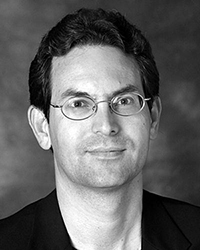College Hosts Biomarker Research Symposium
On December 6, the University of Arizona College of Medicine – Phoenix hosted a symposium for researchers, physicians, students, residents and members of the community to learn more about how biomarker discoveries can be applied to the treatment of diseases.

The keynote speaker, John D. Halamka, MD, MS, presented “The Next Great Informatics Challenges in Health Care.” Dr. Halamka is the international health care innovation professor at Harvard Medical School and chief information officer of Beth Israel Deaconess Health System.
Other speakers included:
- Anna Barker, PhD, director of the National Biomarker Development Alliance, co-director of Complex Adaptive Systems and professor in the School of Life Sciences at Arizona State University.
- Donald A. Berry, PhD, founder of Berry Consultants LLC and a professor in the Department of Biostatistics at the University of Texas MD Anderson Cancer Center.
- Michael Fallon, MD, FACP, executive director for Clinical Research and chair of the Department of Internal Medicine at the UA College of Medicine – Phoenix.
- Jonathan Lifshitz, PhD, director of the Translational Neurotrauma Research Program — a joint venture with Barrow Neurological Institute at Phoenix Children’s Hospital, the Department of Child Health at the UA College of Medicine – Phoenix and the Phoenix Veterans Affairs Health Care System — as well as an associate professor of Child Health at the UA College of Medicine – Phoenix.
- Yves Lussier, MD, FACMI, associate vice president for Information Science and chief knowledge officer of the University of Arizona Health Sciences; founding director of the Center for Biomedical Informatics and Biostatistics; and a professor of Medicine.
- Timothy K. McDaniel PhD, senior vice president of Emerging Opportunities and professor of Integrated Cancer Genomics at Translational Genomics Research Institute and City of Hope.
- Akinlolu Ojo, MD, MPH, PhD, MBA, associate vice president for Clinical Research and Global Health Initiatives at the University of Arizona Health Sciences and a professor of Medicine at the UA College of Medicine – Tucson.
- Eric M. Reiman, MD, CEO of Banner Research and a professor of Psychiatry at the UA College of Medicine – Phoenix.
- Dr. Andreas Theodorou, chief education officer with Banner University Medical Group, as well as professor and vice chair of Clinical Affairs and Quality for the Department of Pediatrics at University of Arizona College of Medicine – Tucson.
The event was free, thanks to sponsors Arizona Biomedical Research Center and the Flinn Foundation.
A poster session for abstracts that report processes or results related to biomarkers, specimen management, personalized medicine, big data analysis and informatics concluded the symposium.
Contact
Casey Sapio
Phone: 602-827-3630
About the College
Founded in 2007, the University of Arizona College of Medicine – Phoenix inspires and trains exemplary physicians, scientists and leaders to advance its core missions in education, research, clinical care and service to communities across Arizona. The college’s strength lies in our collaborations and partnerships with clinical affiliates, community organizations and industry sponsors. With our primary affiliate, Banner Health, we are recognized as the premier academic medical center in Phoenix. As an anchor institution of the Phoenix Bioscience Core, the college is home to signature research programs in neurosciences, cardiopulmonary diseases, immunology, informatics and metabolism. These focus areas uniquely position us to drive biomedical research and bolster economic development in the region.
As an urban institution with strong roots in rural and tribal health, the college has graduated more than 1,000 physicians and matriculates 130 students each year. Greater than 60% of matriculating students are from Arizona and many continue training at our GME sponsored residency programs, ultimately pursuing local academic and community-based opportunities. While our traditional four-year program continues to thrive, we will launch our recently approved accelerated three-year medical student curriculum with exclusive focus on primary care. This program is designed to further enhance workforce retention needs across Arizona.
The college has embarked on our strategic plan for 2025 to 2030. Learn more.